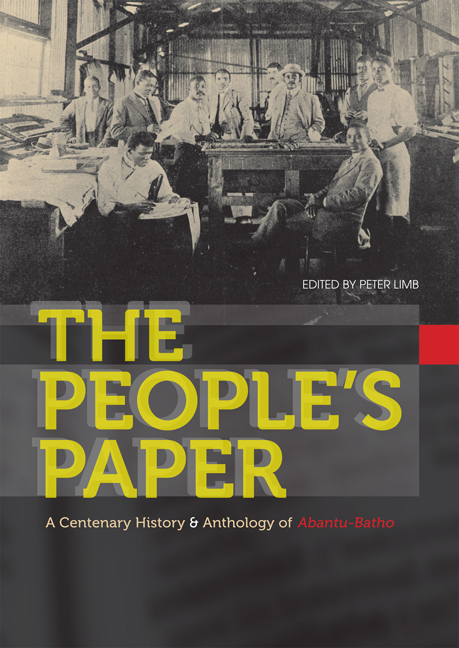Book contents
- Frontmatter
- Contents
- Contributors
- Acknowledgements
- Preface
- List of Abbreviations and Acronyms
- List of Illustrations
- PART I Essays
- Overview
- FOUNDERS AND EDITORS
- THEMES AND CONNECTIONS
- Chapter 6 The Swazi Royalty and the Founding of Abantu-Batho in a Regional Context
- Chapter 7 Abantu-Batho and the Xhosa Poets
- Chapter 8 African Royalty, Popular History and Abantu-Batho
- Chapter 9 ‘Johannesburg in Flames’: The 1918 Shilling Campaign, Abantu-Batho and Early African Nationalism in South Africa
- Chapter 10 Garveyism, Abantu-Batho and the Radicalisation of the African National Congress during the 1920s
- Chapter 11 An African Newspaper in Central Johannesburg: The Journalistic and Associational Context of Abantu-Batho
- Conclusion: Assessing the Decline and Legacy of Abantu-Batho
- PART II Anthology
Chapter 7 - Abantu-Batho and the Xhosa Poets
from THEMES AND CONNECTIONS
Published online by Cambridge University Press: 21 April 2018
- Frontmatter
- Contents
- Contributors
- Acknowledgements
- Preface
- List of Abbreviations and Acronyms
- List of Illustrations
- PART I Essays
- Overview
- FOUNDERS AND EDITORS
- THEMES AND CONNECTIONS
- Chapter 6 The Swazi Royalty and the Founding of Abantu-Batho in a Regional Context
- Chapter 7 Abantu-Batho and the Xhosa Poets
- Chapter 8 African Royalty, Popular History and Abantu-Batho
- Chapter 9 ‘Johannesburg in Flames’: The 1918 Shilling Campaign, Abantu-Batho and Early African Nationalism in South Africa
- Chapter 10 Garveyism, Abantu-Batho and the Radicalisation of the African National Congress during the 1920s
- Chapter 11 An African Newspaper in Central Johannesburg: The Journalistic and Associational Context of Abantu-Batho
- Conclusion: Assessing the Decline and Legacy of Abantu-Batho
- PART II Anthology
Summary
Bitter rivalries and factionalism run through the history of African language newspapers in South Africa. In the case of Xhosa journalism, there was considerable tension between the mission paper Isigidimi sama-Xosa of Lovedale and the independent secular paper Imvo Zabantsundu in King William's Town after John Tengo Jabavu left Isigidimi to found Imvo in 1884, a rivalry that ultimately led to the demise of Isigidimi by the end of 1888. The air crackled between Jabavu's Imvo and Izwi Labantu, published in East London between 1897 and 1909, which supported the South African Native Congress (SANC), the largely Capebased predecessor of the South African Native National Congress (later African National Congress, or ANC). No rivalry, however, was quite as vituperative as that between the two multilingual Johannesburg newspapers Abantu-Batho and Umteteli wa Bantu. Despite their mutual antipathy, however, both of these newspapers made significant contributions to the literary careers of two of the greatest Xhosa poets of the 1920s, although the poets themselves differed in their responses to the rivalry.
In the wake of the radicalisation of the Transvaal Native Congress (TNC) after the end of World War I and the disagreement over Congress strategy, a party of moderates approached the Chamber of Mines with a request for support to start a newspaper in opposition to Abantu-Batho. The Chamber proceeded to establish such a newspaper with policies and practices designed to counter and undermine Abantu-Batho. According to Mary Benson's notes of an interview with T. D. Mweli Skota,
Dube, Masane [Msane], Mbela [M'belle], Maxelele [Maxeke]. They went to man in charge Chamber of Mines and told him these young people very extreme and they wanted to start a paper in opposition to A.B., and he said all right come again, so when next they went Chamber had decided to start paper for them. Wouldn't give them money but started paper for them and this was not what they wanted. Maxelele employed and Dube as editors and about £60 per month one salary. Plaatje had gone to Canada after Versailles deputation and wrote to Skota that he knew nothing about this and was not a party to it. This new set-up could pay and took all the A.B. compositors so had to train new ones. New paper given out to people in mines and not sold for about six months.
- Type
- Chapter
- Information
- The People’s PaperA Centenary History & Anthology of Abantu-Batho, pp. 201 - 225Publisher: Wits University PressPrint publication year: 2012



